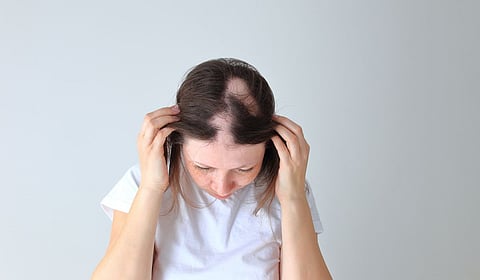WEDNESDAY, Aug. 14, 2024 (HealthDay News) -- Withdrawal of baricitinib therapy results in loss of treatment benefit for most patients with severe alopecia areata (AA), according to a study published online Aug. 14 in JAMA Dermatology.
Brett King, M.D., Ph.D., from the Yale School of Medicine in New Haven, Connecticut, and colleagues reported results from the randomized withdrawal period of the BRAVE-AA1 trial, which was conducted at 70 centers in three countries. The original trial included 654 adults with severe AA (Severity of Alopecia Tool [SALT] score ≥50) who were randomly assigned to receive treatment with baricitinib 4 mg, baricitinib 2 mg, or placebo. At week 52, 154 responders (SALT score ≤20) were re-randomly assigned to continue with their current dose of baricitinib or transition to placebo (randomized withdrawal); 10 of 39 responders to baricitinib 2 mg and 30 of 115 responders to baricitinib 4 mg were re-randomly assigned to placebo at week 52.
The researchers found that 0 percent and 10 to 11 percent of patients lost treatment benefit, regardless of dose, at four and eight weeks of treatment withdrawal, respectively. Eighty percent of patients had lost benefit at week 152 compared with 7 percent of those continuing baricitinib, regardless of dose. After retreatment, 63 percent of those taking 2 mg and 87.5 percent of those taking 4 mg recaptured a SALT score ≤20.
"These data add to our growing knowledge of severe AA, showing that it is a chronic disease and similar to other autoimmune diseases and requires long-term maintenance therapy for most patients to maintain successful outcomes," the authors write.
Several authors disclosed ties to biopharmaceutical companies, including Eli Lilly, which funded the study and developed baricitinib under license from Incyte Corporation.
Abstract/Full Text (subscription or payment may be required)


